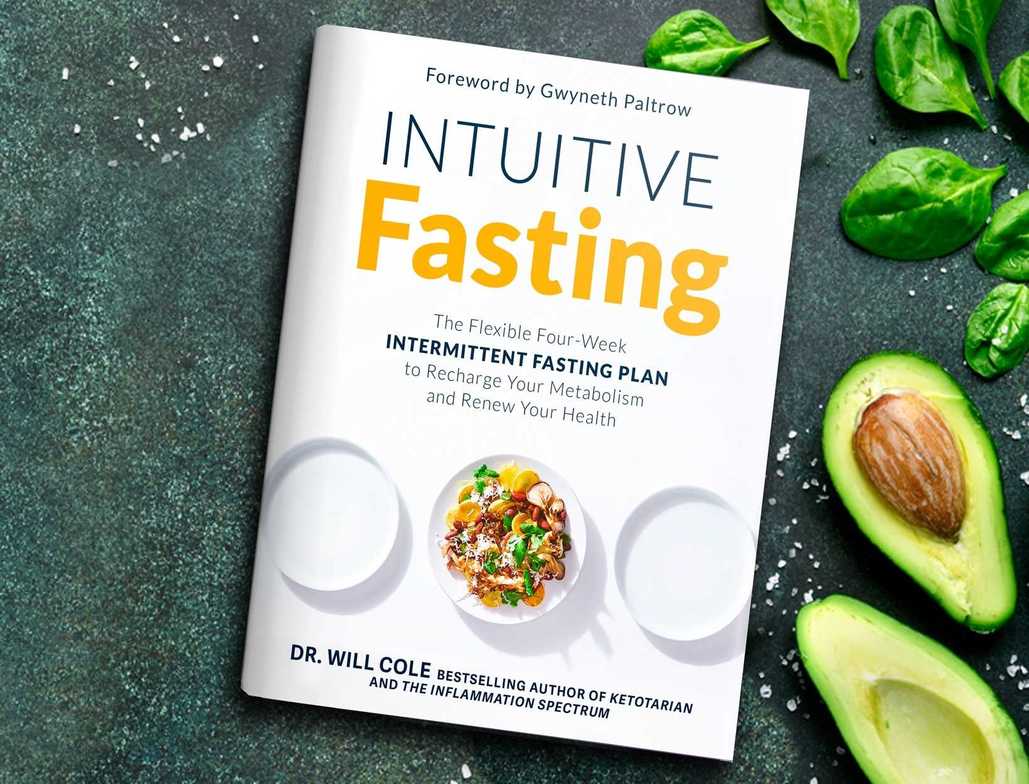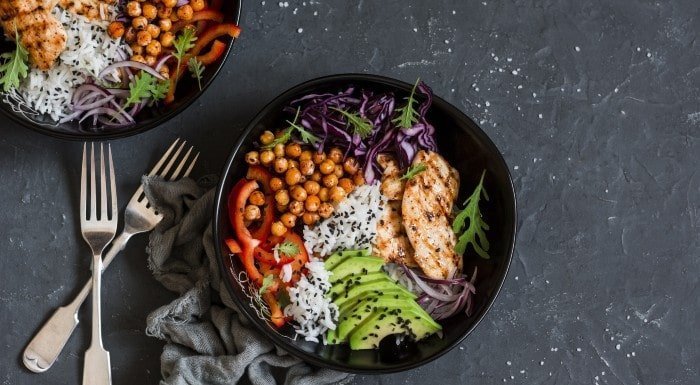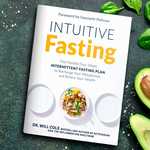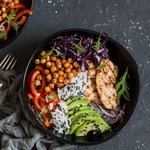THE NEW FASTING PLAN TO AMPLIFY HEALTH BENEFITS, BALANCE REST AND REPAIR, AND ENJOY NUTRIENT-DENSE, DELICIOUS FOODS.
Intermittent Fasting
Intermittent Fasting (IF) is currently one of the world's most popular health and fitness trends today. People are using it to improve their health, simplify their lifestyles and lose weight. It is a way of eating that cycles between periods of fasting and eating. It doesn't specify what you should eat, but when you should eat it, so it's not a diet in the traditional sense.
Naturopathic Doctor Sat Dharam Kaur encourages us to practice IF in her book, The Complete and Natural Medicine Guide to Breast Cancer. She suggests to fast one day a week by consuming less than 500 calories in one day, helping to reduce inflammation and insulin levels. It also can help with weight loss and cancer care support.
In a recent Breastcancer.org article, they reinforced this assertion that intermittent fasting is safe and possible for people with cancer, and that it may boost the effectiveness of certain cancer treatments. Promising research demonstrates that IF reshapes metabolism and anti-tumor activity in cancer patients.
Dr. Will Cole is a leading Functional Medicine expert who consults people around the world specializing in chronic disease and issues related to thyroid, autoimmune and brain conditions. He is the author of Intuitive Fasting, The Flexible Four-Week Intermittent Fasting Plan to Recharge your Metabolism and Renew your Health.
I just bought his Intuitive Fasting book, and excitedly read the book insert. With his fresh, new approach to fasting, Dr. Cole provides the tools to take control of our hunger and makes intermittent fasting intuitive. You'll get in touch with your instinctive eating patterns, and become healthier and more mindful about how and when you eat. When your body is out of balance it can be very difficult to discern what it needs to build vibrant wellness. Intuitive Fasting will show how to finally find metabolic flexibility. Once you've reached metabolic flexibility, you can intuitively trust your body to function at optimal capacity, whether you've eaten six minutes ago or six hours ago.
On his website, he writes, “For some, the idea of fasting by eating only one or two meals a day still sounds like an extreme and overly restrictive dieting tactic. But many of us already feel like victims to our daily eating schedule: three meals a day, plus snacks. Eat every few hours, we are told by the experts. This fixed eating schedule has become the norm. The truth is, this is an artificially constructed schedule that does not reflect our bodies' natural and most optimal eating schedule. In fact, eating three meals every day can cause metabolic inflexibility, which can easily lead to inflammation, weight gain, fatigue and chronic health problems. For millions of years, our bodies have actually functioned best with periodic times of fasting.”
I invite both practitioners and clients of BHC to join me in doing this Intermittent Fasting Plan for the month of March. During the four-week flexible fasting plan Dr. Cole will guide us through varying intermittent fasting windows, with each week of the plan tailored to focus on a different aspect of your health. By the end of the four weeks you will have all the tools necessary to reset your body, recharge your metabolism, renew your cells, and rebalance your hormones.
Send me an email if you are interested in joining this Intuitive Fasting Challenge. You can order the book on-line and we can all start together March 1st. I will include a link to a private Facebook page where all those joining me can share their experiences, ideas, and questions.
I first heard about this Intuitive Fasting approach from Paul Buffel, a health care practitioner at BHC who completed the fast this January. Here is what he has to say about the experience.
PAUL BUFFEL
There are plenty of accolades and criticisms of Dr. Cole’s book on the internet. I agree with some opinions from both sides. However, I was intrigued by his assertion that the evolution of human physiology took advantage of the natural cycles of food plenty and scarcity.
It is his belief that the capacity for our bodies to switch fuel sources from sugars and carbohydrates during times of plenty, to fat during times of food scarcity, supports detoxification maximizing immune, hormone, and cell renewal functions. He calls this metabolic flexibility. Dr. Cole asserts that reconnecting with our intuition and direct experience of food is an antidote to the modern increase in eating disorders, inflammatory diseases, autoimmune disorders and chronic pain.
Our modern relationship to food relies heavily on sugars, carbs and processed foods with little to no scarcity. There can be a disconnect with how we think we should be eating, compared to how we actually feel, and how this affects the way we eat. Playing around with eating windows, low sugar/carb, whole, fresh, anti-inflammatory foods with a focus on what you experience during the month intrigued me.
As with any eating plan, if one has a challenged relationship with food either emotionally or physically, a strict adherence to any plan can cause fixations, obsessive behaviour, and over-ride our intuition. If you are concerned about this seek advice and support from a trained nutrition professional before embarking on any plan.
What I learned after a month on this plan:
- The need to remain flexible and not fall into the mentality that there is good and bad food. Self-reflection on how I was feeling when eating certain foods, not eating certain foods, or playing with eating windows (IF) gave me the answers to what actually made me feel my best. I have taken this knowledge to make food choices that support feeling better physically and mentally for me, not someone else. I found this informative and fun. I also realize this will be an ongoing process that may change over time led by my direct experience.
- Although I LOVED his menus (and I consider myself a foodie), I didn’t use stevia, did have a bit of dairy the first week, and ate more calories than his portions offered (and still leaned up).
- I was surprised that I liked the longer fasts. I believed I was the type of person who needed food constantly. My ability to stay focused and energized on 20 hour fasting days while at work was a complete surprise and oddly freeing.
- I needed to eat differently, and outside this plan’s parameters, when doing activities I loved (like the Ultra Endurance Fat Viking fat bike event the last weekend of my fast). I realized the importance of certain foods when doing increased physical activity. This is where intuition and experience came into play the most strongly for me. I veered from the plan, without guilt, so I could feel my best and enjoy my rides. I saw this as a success, not a failure, while on the plan.
- A chronic pain I have had for years due to an initial injury and then degenerative joint changes, was reduced dramatically by day 10 of the program. I am now experimenting with how food may have an influence on inflammation that isn’t the cause of all my pain, but may be contributing to the intensity.
- I didn’t think I could possibly have a deeper appreciation and love for the role food plays in my life. The sheer pleasure of growing, preparing with love and care, presenting, and sharing healthy, delicious, visually appealing food creates connection and meaning in my life. But I do, appreciate it even more deeply.
I wish all those joining Pam for this IF Challenge increased insight into what makes you feel your best self and a deepening appreciate for the role food plays in your life.









